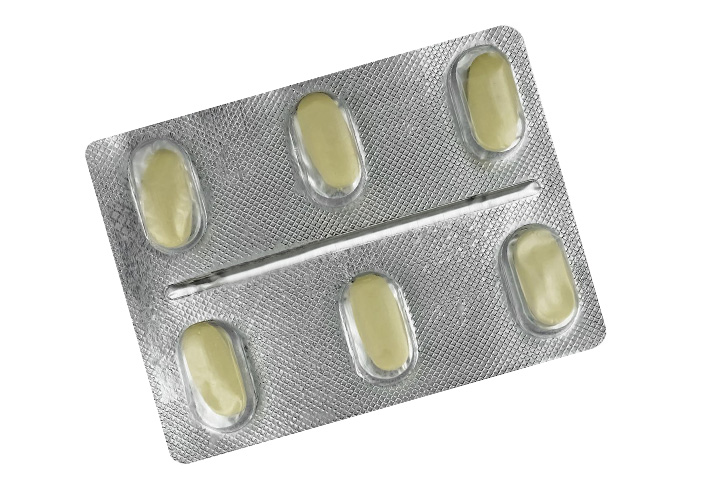Biaxin
Biaxin is a macrolide antibiotic used in the treatment of the following infections caused by susceptible germs:
- Respiratory infections such as acute and chronic bronchitis, pneumonia, bronchopneumonia.
- Throat, nose and ear infections such as pharyngitis, sinusitis.
- Mild superficial skin infections such as impetigo, erysipelas, hair follicle and sebaceous gland infections (folliculitis, furunculosis), abscesses, infected wounds.
- Infections caused by certain non-tuberculous mycobacteria, or for the prevention of these infections.
- To eradicate Helicobacter pylori during treatment of duodenal ulcers.
What Does Biaxin Contain?

1 film-coated tablet contains:
Active ingredients
250 mg resp. 500 mg clarithromycin
Excipients
Core: Croscarmellose sodium, Microcrystalline cellulose, Povidone K 30, Magnesium stearate, Colloidal anhydrous silica, Talc.
Film coating: Hypromellose, Propylene glycol, Titanium dioxide (E171), Hydroxypropyl cellulose, Sorbitan oleate, Chinolingelb (E104), Vanillin.
Uses
Biaxin should not be taken in cases of known or suspected hypersensitivity to macrolide antibiotics such as clarithromycin or erythromycin, or to any of the other ingredients of this drug.
Biaxin must not be taken at the same time as the following medicines:
- medicines intended to stimulate gastrointestinal activity (medicines containing cisapride as the active substance);
- neuroleptics (containing pimozide as the active ingredient);
- sedatives or sleep-inducing drugs (benzodiazepines, e.g. with the active ingredient midazolam);
- migraine or hypotension medication (with active ingredients from the ergot alkaloid group, such as ergotamine or dihydroergotamine);
- anti-allergy products (containing as active ingredients: astemizole and terfenadine);
- medicines to lower high blood fat levels (such as lovastatin, simvastatin or lomitapide);
- anti-gout medication (containing the active ingredient colchicine);
- anti-platelet agents (containing the active substance ticagrelor);
- medicines for the treatment of psychosis (containing the active substance quetiapine);
- medicines to treat heart conditions (containing the active substance ranolazine);
- medicines for the treatment of nausea and vomiting (containing the active substance domperidone).
Biaxin must not be taken if:
- you have a history of heart rhythm disorders (ventricular tachycardia, including torsades de pointes) or if a special change in the electrocardiogram, QT prolongation, has been observed.
- you have a potassium or magnesium deficiency (hypokalaemia or hypomagnesaemia) or
- you suffer from severe liver failure in association with renal insufficiency.
How To Take
Biaxin should be taken as directed by your doctor.
In adults and adolescents over 12 years of age, the usual daily dose is 2x 1 film-coated tablet of 250 mg (= 500 mg); take the tablets morning and evening. If necessary, your doctor may increase this dosage.
For infections caused by non-tuberculous mycobacteria, the recommended dose for treatment and prevention is 2x 1 film-coated tablet of 500 mg per day (= 1000 mg).
For the eradication of Helicobacter pylori, the recommended dosage is 2x 1 film-coated tablet of 500 mg (= 1000 mg) Biaxin per day, with 2x 1000 mg amoxicillin per day and 1-2x 20 mg omeprazole per day for 7-10 days.
Swallow Biaxin film-coated tablets without chewing. The medicine may be taken independently of meals, i.e. on an empty stomach or with meals.
Duration of treatment: In general, the duration of treatment is 7 to 14 days. However, depending on the nature of your illness, your doctor may also prescribe Biaxin for a longer period, particularly in cases of infection due to non-tuberculous mycobacteria.
Biaxin is not suitable for the treatment of children under the age of 12. A special formulation (children's suspension) is available for the treatment of children.
Any antibiotic therapy started must be continued for as long as prescribed by the doctor. The symptoms of the disease often disappear before the infection is completely cured. Too short a course of treatment or stopping treatment prematurely may encourage a relapse of the disease.
Side Effects
Biaxin may cause the following side effects:
Common: insomnia, headache, dazedness, changes in taste, nausea, vomiting, loose stools and diarrhoea, feeling of pressure in the upper abdomen (in rare cases convulsively), digestive disorders, itching, skin rash, increased sweating, lack of strength.
Tell your doctor immediately if you experience severe or persistent diarrhoea during or after treatment with Biaxin.
In the event of diarrhoea, medicines that inhibit intestinal peristalsis (the movement of the intestine) must not be taken.
Severe allergic reactions have been observed in rare cases. Contact your doctor immediately in the event of allergic symptoms such as skin rash, facial oedema or respiratory distress.
Occasional: disturbance of the sense of smell and reversible discolouration of the tongue and teeth (usually blackish or dark brown, especially when Biaxin and omeprazole are used together), inflammation of the tongue or oral mucosa, belching, fungal infections of the skin/mucosa.
Consult your doctor if you discover whitish deposits in your mouth or if the lining of your mouth or tongue is inflamed.
The following symptoms may also occasionally occur: loss or reduction of appetite, constipation, dry mouth, bloating, anxiety, dizziness, tremor, drowsiness, hearing impairment with reversible partial deafness, tinnitus, palpitations, malaise, chest pain, tiredness, chills.
In rare cases, Biaxin, like other medicines of the same type, has been held responsible for disorders of the liver, pancreas or kidneys. Consult your doctor if you experience abdominal pain, loss of appetite, tiredness or yellowing of the skin.
Rare cases of convulsions have been reported.
In rare cases, a reduction in blood sugar levels has been observed, particularly with concomitant treatment with certain oral antidiabetics or insulin.
Arrhythmias and ventricular fibrillation have also been observed rarely.
There have been reports of patients with myasthenia gravis worsening on clarithromycin therapy.
There have been reports of patients with muscle pain or muscle disease. Nightmares, confusional states, hallucinations, depression, behavioural changes, acne, tingling, loss of sense of taste and smell may also occur.
Rarely, muscular pain or weakness may occur when taking drugs to lower blood fat levels that are too high (statins), which may be a sign of serious muscular deterioration (rhabdomyolysis).
There have also been reports of haemorrhage in patients receiving oral anticoagulants at the same time.
If any side effects persist for a long time or are quite serious (diarrhoea, for example), report them to your doctor or pharmacist.
If you notice any side effects, please inform your doctor or pharmacist. This applies in particular to side effects not mentioned in this package leaflet.
Precautions
Inform the doctor treating you if:
- you suffer from heart, liver or kidney disease,
- you suffer from an electrolyte disorder, e.g. magnesium deficiency, or
- if a member of your family has had heart rhythm disorders (ventricular tachycardia, including torsades de pointes) or if a special change in the electrocardiogram, called QT prolongation, has been noted.
Certain other medicines may interact with Biaxin. You should therefore tell your doctor if you are taking any medicines from the following classes:
- hydroxychloroquine or chloroquine (for the treatment of diseases such as rheumatoid arthritis or the treatment or prevention of malaria). Taking these medicines at the same time as clarithromycin may increase the risk of adverse reactions affecting the heart;
- asthma medication (active ingredients: aminophylline, theophylline);
- insulin/antidiabetics (active ingredients: glibenclamide, glibornuride, gliclazide, glimepiride, nateglinide, pioglitazone, repaglinide, rosiglitazone);
- for epilepsy and nerve pain (active ingredients: carbamazepine, phenytoin, valproic acid);
- coronary heart disease (active ingredient: digoxin);
- heart rhythm disorders (active ingredients: quinidine, disopyramide);
- against hypertension, in cases of heart disease (active ingredients: verapamil, amlodipine, diltiazem);
- against infections caused by mycobacteria (active ingredients: rifabutin, rifampicin);
- against the multiplication of viruses (active ingredients: ritonavir, efavirenz, nevirapine, saquinavir, atazanavir);
- fungal infections (active ingredients: itraconazole, fluconazole);
- for migraines or hypotension (with active ingredients from the ergot alkaloid group, e.g. ergotamine, dihydroergotamine);
- for sedation and sleep (benzodiazepine-based active ingredients: alprazolam, midazolam, triazolam, hexobarbital);
- dermatitis (active ingredient: methylprednisolone);
- impotence (active ingredients: sildenafil, tadalafil, vardenafil);
- cancer (active ingredients: vinblastine, ibrutinib);
- gynaecological disorders and Parkinson's disease (active ingredient: bromocriptine);
- against bladder instability (active ingredient: tolterodine);
- for circulatory problems in the legs (active ingredient: cilostazol);
- to thin the blood (active ingredients: warfarin, dabigatran, rivaroxaban, apixaban);
- to reduce high blood lipid levels (statins) (see also "When Biaxin should not be used" and "What side effects may Biaxin have");
- for inhibition of the immune system (active ingredients: cyclosporine, tacrolimus);
- agents liable to cause hearing damage (in particular aminoglycoside antibiotics).
Severe allergic reactions have been observed in rare cases.
Contact your doctor immediately:
- if you develop an itchy skin rash, hives, facial swelling, chest tightness or respiratory distress.
- if you develop a fever, a growing feeling of sickness or a painful rash that spreads, particularly if such a rash is accompanied by blistering and inflammation of the eyes and mucous membranes or if a painful rash of small purulent blisters (pustules) spreads. In such cases, you must stop taking Biaxin immediately and consult a doctor without delay.
Your doctor will check the dosage of these medicines.
Please inform your doctor immediately in the event of severe and continuous diarrhoea during or after the end of treatment with Biaxin.
This medicine may affect reactions, driving ability and the ability to use tools or machines!
What else do you need to consider?
This medicine has been personally prescribed for you by your doctor for the treatment of your current illness.
The antibiotic contained in Biaxin is not effective against all micro-organisms likely to cause infections. Using the wrong antibiotic or at the wrong dosage can cause complications. You should therefore never use this medicine on your own to treat other illnesses or other people.
Pregnancy and Breastfeeding
If you are pregnant, planning to become pregnant, or are breastfeeding, please notify your doctor or pharmacist and avoid taking Biaxin unless expressly advised to do so.
Pneumonia or bacterial pneumopathy
Pneumonia or bacterial pneumonitis is an acute bacterial infection of the lungs, most often caused by pneumococcus, but also by Mycoplasma pneumoniae and other bacteria. It occurs immediately or may complicate the course of a viral pneumonia, such as that caused by influenza.
A person suffering from bacterial pneumonia or pneumopathy will present a variety of symptoms: fever, cough, chest pain, shortness of breath, headache, malaise, etc. The diagnosis is confirmed by a chest X-ray. The disease is usually cured, but complications can occur.



